Iran Says Saudi Arabia Ready To Advance Talks
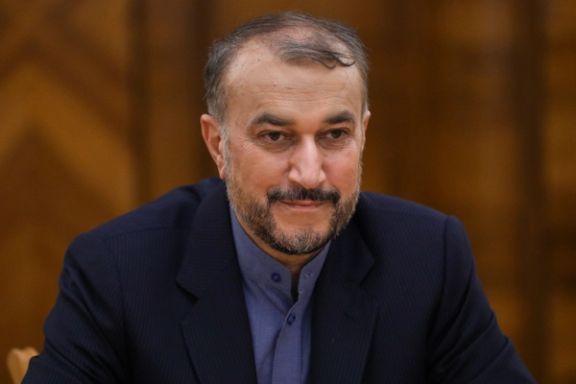
Iran's foreign minister says Saudi Arabia has shown readiness to advance the bilateral talks from security issues to the political phase.

Iran's foreign minister says Saudi Arabia has shown readiness to advance the bilateral talks from security issues to the political phase.
In an interview broadcast on state television Thursday evening, Hossein Amir-Abdollahian said, "Last week we received a message from Iraqi foreign minister [Fuad Hussein] saying that the Saudi side is ready to move the talks from a security phase to a political and public one.”
"We also expressed our readiness to continue talks at the political level so that it leads to the return of Iran-Saudi Arabia ties to the normal level," he added.
Late in June, Iraqi Prime Minister Mustafa al-Kadhimi traveled to Iran and met with President Ebrahim Raisi after a visit to Saudi Arabia and meeting with the kingdom’s de facto ruler Crown Prince Mohammed bin Salman aimed at jumpstarting stalled talks between Tehran and Riyadh.
Iran and Saudi Arabia -- which are locked in proxy conflicts around the region -- have held several rounds of talks mediated by Baghdad since 2021. In April, they finally held the much-anticipated fifth round of negotiations, saying that a clear outlook was reached for the resumption of regular talks.
However, it was the Islamic Republic that suspended the talks earlier in April a day after Saudi Arabia announced it had beheaded 81 men, for “heinous crimes.” Forty-one were Saudi Shiites, Human Rights Watch reported, apparently convicted over protests.
Saudi Arabia cut ties with Iran in 2016 when mobs attacked its embassy in Tehran after Riyadh executed 47 dissidents including the leading Shiite cleric Sheikh Nimr al-Nimr.

The ultra-conservative Paydari Front seems to have succeeded in taking more ground from Parliament Speaker Mohammad-Bagher Ghalibaf after a scandal in April.
On July 17, lawmakers re-elected Nasrollah Pejmanfar, a die-hard Paydari member, as chairman of the high-profile Article 90 committee. This will give Paydari more leverage against Ghalibaf and his allies in the parliament.
The rivalry between Ghalibaf and Paydari members dates to the 2013 presidential elections in which both Ghalibaf and the Paydari-backed former nuclear negotiator Saeed Jalili ran against moderate conservative Hassan Rouhani who won with reformists’ support.
Ultra-conservatives whose domain of influence in the Islamic Republic’s power structures is consistently growing, dealt a heavy blow on Ghalibaf in April by leaking a video of his family members returning to Iran from a shopping trip to Turkey with massive luggage that included a layette set for his unborn grandchild.
The video leaked on social media by a well-known hardliner activist, Vahid Ashtari, was followed by a barrage of criticism and resurfacing of other alleged corruption cases against the family, which prompted calls for his resignation.
The scandal got worse as the whistle blower claimed that during the trip, Ghalibaf’s wife had bought two apartments in Istanbul worth $1.6 million.
Ashtari’s revelations portrayed the Speaker as a hypocrite who tells others to live in austerity while his own family lives in luxury. Referring to government policies, Ashtari argued that it was not acceptable for the speaker to preach to people to buy Iranian-made cars and other products, ban the import of home appliances, and send his own family abroad to buy a layette set for a grandchild.

Many speculated that the shopping spree by Ghalibaf’s family may have not been leaked if it were not for the undercover surveillance of him and his family members by elements close to the Paydari faction in intelligence organizations.
Ghalibaf has weathered several major scandals in the past decade with the help of his political allies. During his term as mayor of the capital Tehran, several of Ghalibaf’s deputies and people in his close circle were sentenced to 20 to 30 years in prison for corruption but the judiciary never prosecuted him.
As before, after the recent scandal he threatened legal action against those who he accused of defaming him but his attempt at minimizing the shopping scandal which came to be known as “layette-gate” did little to protect him against rivals’ attacks.
Ghalibaf has also suffered the loss of a very powerful ally, the IRGC intelligence chief Hossein Ta’eb, who was dismissed in June for other reasons, but his absence could make Ghalibaf much more vulnerable to his rivals.
Ghalibaf’s supporters say in recent months that the state broadcaster (IRIB), whose head Payman Jebelli has close ties to Paydari has been intentionally underrepresenting news related to his activities including his “provincial visits”.
“The few seconds-long coverage of Dr. Ghalibaf’s provincial trip by the state broadcaster is nothing other than censorship driven by partisan interests … This kind of news coverage related to speaker of the parliament is spiteful,” a Ghalibaf supporter tweeted earlier this month.
The presidential elections last year consolidated hardliners grip on all three government branches, which are now united against reformist and moderate conservative rivals. But in recent months many have predicted an eventual confrontation between the parliament speaker and the president and the emergence of deep rifts in the so-called ‘Principlist’ camp.
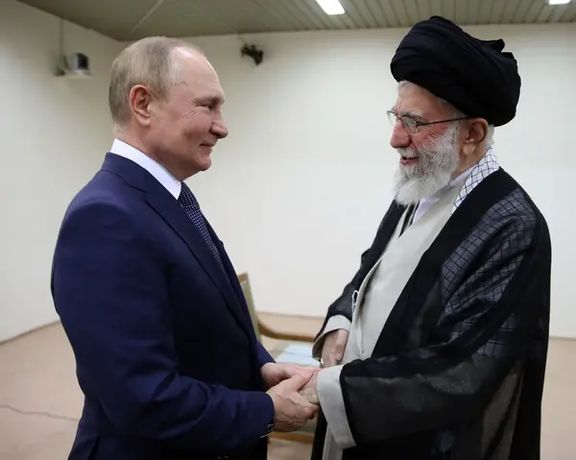
Iranian Supreme Leader’s endorsement of the Russian invasion of Ukraine is not surprising, Speaker of the US House of Representative Nancy Pelosi said Thursday.
Asked by Iran International correspondent Arash Aalaei about Islamic Republic’s ruler, Ali Khamenei praising Vladimir Putin’s “initiative” to invade Ukraine, Pelosi said, “Tyrants find their friends and there’s no surprise in any of that. I don’t think anybody has ever recognized Khamenei as a respecter of boundaries or people.”
During Putin’s trip to Tehran July 19, Khamenei lauded the Russian leader’s initiative in attacking Ukraine, saying that NATO would have launched a war sooner or later in Ukraine.
Pelosi added, “To me what Khamenei said was practically irrelevant, but what is relevant is the weapons he may supply Russia with.”
The United States has warned that Russia is preparing to receive Iranian military drones to use in Ukraine and has even sent teams to Iran to review its options. Iran has half-heartedly denied the accusation, but Khamenei’s strong endorsement of the invasion is a signal that Tehran would have little hesitation in supplying the drones.
Pelosi sounded resigned that Iran will cooperate with Russia. “It’s tyrant-to tyrant; doesn’t matter what any of us think; it’s what they will do,” she said.
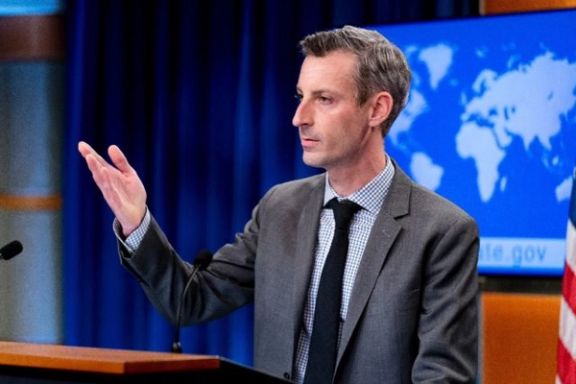
The US says Iran has abandoned the hollow veil of neutrality vis-à-vis the Russian invasion of Ukraine and openly supports President Vladimir Putin in his war against the Ukrainians.
State Department Spokesperson Ned Price said on Wednesday that “it was... striking to hear the supreme leader, in really no uncertain terms, essentially endorsing President Putin’s brutal invasion of Ukraine.”
He said, “It was especially striking because Iran all this time had attempted to maintain a veil of neutrality," pretending to be opposed to the war. “It’s now clear that was entirely hollow.”
Price also said that Russia having to seek out UAV technology from Iran means that it does not have the indigenous ability to produce it because of the export controls and other measures that the US imposed, which indicates its isolation. “The fact that President Putin would need to run into the arms of one of the most heavily sanctioned, one of the most isolated countries in the world, I think, speaks to the dire straits Moscow currently finds itself in.”
Iran has a choice. It can continue to opt for a position of relative dependency on a country like Russia, or it can choose the path of diplomacy, and specifically it can choose to take up the deal that’s been on the table for some time now, to have an economic relationship with other countries around the world, Price said.
Earlier on Wednesday, US defense officials as well as the head of US Central Intelligence Agency warned Iran against providing military drones to Russia.
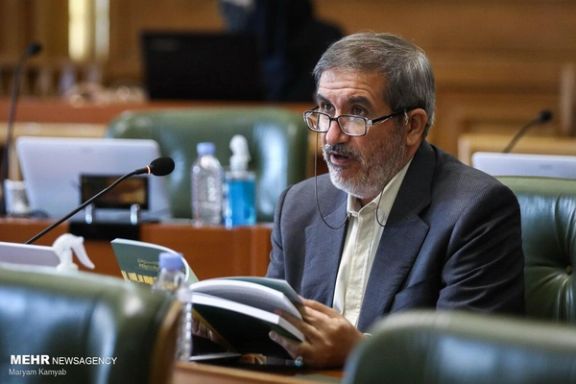
Media in Tehran quoted Naser Amani, a Tehran City Council member Wednesday as saying that "the people in Iran are seriously dissatisfied with the government."
Amani added that the people are so angry over the behavior and performance of the authorities that they attack any official as soon as they see them. "People make such strongly-worded comments about officials that I cannot quote what they say about them," Amani said.
IRGC’s Fars news website said Amani receives many messages from the people and municipality workers, but as he told Tehran City Council Chairman Mehdi Chamran, he has to censor the comments in his reports to the council.
Amani said that municipality workers, like other government employees are angry because the government has failed to meet its promise of giving a 10 percent pay rise to its employees. He said some municipality workers did not get any raise while others received far less than 10 percent.
The comments by Amani came one day after Parviz Piran, a prominent sociologist and Tehran University academic told Shargh newspaper in Tehran that "There is a very serious likelihood of a "white mutiny" or a "Bread Riot" in Iran.
Professor Piran said that Iranian society cannot envisage a future, adding, "All that some 50 to 60 percent of the population in Iran can do is look for bread, as the minimum requirement for survival."
A survey earlier this year found that over 30 percent of Iranian wanted to leave the country out of despair and lack of hope for future..
Piran further said that an extensive body of research in Iran indicates that the government's social capital has dramatically dropped as the people have lost their confidence in its management. This has coupled with a decline in ethical values that could bring the society to the verge of mutiny, the academic maintained.
He said that trying to make ends meet and pass the day without thinking of tomorrow is a key pathological characteristic of the Iranian society today. "This is a seriously dangerous situation," he assessed.
"In such a situation," said the sociologist, "Norms and values become meaningless and sometimes convey exactly the opposite meaning. This effectively erodes solidarity in society." He added that this situation requires a re-definition of norms and values. Piran said that Iranian society desperately needs to criticize itself to facilitate this re-definition.
Without mentioning the Iranian establishment's dogmatic ideological nature, the sociologist stressed that Iranians need to realize the relative nature of ethics, rationality, social progress and so on.Meanwhile, he said that one of the weaknesses of the Iranian society is that it lacks a theoretical foundation for itself. Academics simply tried to adopt foreign theoretical foundations and apply them to the Iranian society.
Piran noted that some politicians force the academics to come up with a solution for the Iranian society's problems, "but how can you come up with solutions if you do not have the right theoretical frameworks?" he asked.
Explaining his theory of "momentary society," Piran said, "When 50 to 60 percent of the population live under the poverty line, all they can do is think of how to feed themselves to ensure their survival. In a society with high unemployment and high cost of housing, people begin to lose their dream of owning a house as they find it impossible.
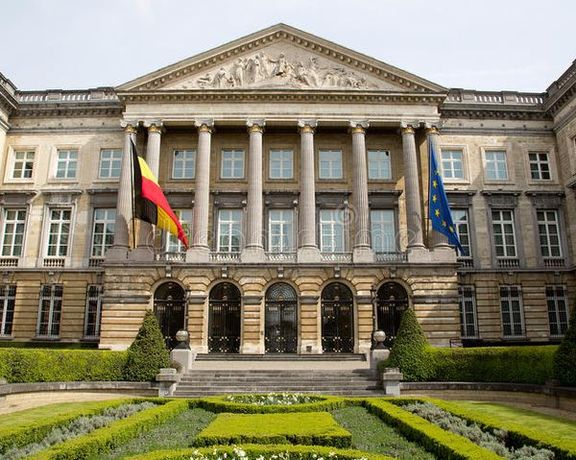
The Belgian Parliament has ratified a controversial prisoner swap treaty with Iran, which facilitates repatriating an Iranian diplomat sentenced to 20 years in jail on a terrorism conviction.
Following several postponements of the vote and a heated debate Wednesday, out of the 131 lawmakers present, 79 voted in favor while 41 rejected the treaty, and 11 abstained just after midnight.
Critics fear that the treaty, which would permit Iranians convicted in Belgium to serve their sentences in Iran and vice versa, will pave the way for the release of Assadollah Assadi, a terrorist convicted for his role in a plot to bomb a gathering of Albania-based opposition group, Mujahedin-e Khalq Organization (MEK) organization in Paris four years ago.
Several Belgian lawmakers shared concerns about why the treaty was rushed through parliament before the summer break, and said they were not able to consult enough external experts ahead of the vote.
Samuel Cogolati, a Green MP, said, “We had to be able to publicly express our reservations and deep concerns, and at the same time do our job as parliamentarians. We tried as much as possible to consolidate, to give guarantees for the rule of law, while ensuring the release of our Belgian compatriot in Iran.”
Meanwhile, Tehran has been holding Belgian humanitarian worker, Olivier Vandecasteele, in jail since February as leverage.
Belgium’s Justice Minister Vincent Van Quickenborne said on July the 6 that the assessment of the Belgian security service was that the failure to pass the bill would increase security threats.